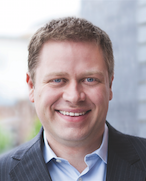Transforming sustainability conversations in a Yale classroom

Let’s talk about broken relationships, human vulnerability, and our tendency to erect walls to keep others from seeing who we really are. You know, fun stuff.
The sustainability conversation can be thorny

Gabriel Grant is a Yale PhD candidate who teaches workshops on how to have difficult, but powerful, conversations about the things that matter. He helps people break down the conversation around sustainability to its most fundamental elements. These elements are the common threads in all conversations, the building blocks of personal and professional relationships.
Grant believes that if he can support his students in transforming their personal/professional relationships through conversation, these aggregated individual conversations will transform and advance the larger sustainability movement.
Poll Everywhere is critical to that method.
“The technology is so powerful, it really takes our work to the next level.” Grant and his colleagues “invite participants to take a different tack, one that’s compatible with the world they want to create.”
What’s not compatible with that vision is the need to be right, righteous, or certain. To break students of conversation-ending habits like these, each of Grant’s students supply the class with one of their own broken conversations. The group then dissects these conversations to learn how different ways of being can support stronger relationships.
Before Poll Everywhere
The process used to start by inviting students to pair off to share an example of a relationship or conversation they’ve “run off the rails.” Pairs would combine into small groups to vote on the best examples, until eventually a few select stories were shared with the entire class.
In many cases, those final examples weren’t ideal specimens for dissection or learning. Students would shield themselves by providing an example that made them look like the good guy, or by providing a relationship example that wasn’t actually broken.
If a student was in conflict with her boss, that specificity might yield some results. If the “broken relationship” was merely a colleague the student didn’t get along with, that example would be too theoretical and abstract to allow the class to really get their hands dirty. If your goal is to teach the anatomy of a frog, dissecting a beetle isn’t going to be very productive.
So Grant needed a way to help his students open up, to give them permission to let their guard down. He found his solution in Poll Everywhere.
After Poll Everywhere
Grant started collecting stories via live polling, which yielded two very significant results:
First, it allowed for a much wider net to be cast. Instead of pulling three samples from the class, now Grant could make sure everyone was participating. He could simply watch how many responses rolled in, compared to the size of the class.
That sample size makes a huge difference. “Instead of ten out of 50 producing transformative results, we get to the end of a 90-minute class and 80 percent are right there with us.”
And if someone provided a poor example, Grant could discuss the pitfalls of the example without attacking its owner. “Before, I could only call BS on one participant [because of time constraints]. Now, we can call BS, and do it in a way that people don’t have to own that that was their response.” Grant can now coach to the examples, without singling out an individual student or making them own their response.
Except, a funny thing happens– They do own their responses.
That’s the second result of using live polling. Turns out, people will make themselves vulnerable when 1) they don’t feel forced, and 2) they see other people doing it.
When one person steps forward to own their response, others inevitably follow.
“What happens is you get an intimacy or honesty, a relatedness. It’s a kind of vulnerability snowball effect. Before, when you raised your hand or shared what you were working on, it was really a leap. With Poll Everywhere, it’s no longer a leap.”
When you’re working with material that depends on the vulnerability of others, anything that breaks down the natural barriers people tend to put up is going to create a more productive environment.
For Grant and his colleagues, who have now seen their model replicated at University of Chicago and Cornell, among many other universities and corporations, Poll Everywhere is critical to that goal.
You can read more about Grant and project partner Jason Jay’s work at Authentic Sustainability, or in their upcoming book Beyond the Choir.
Create a safe space for vulnerability
Every Poll Everywhere account gives you the ability to grant anonymity for a tough conversation. Just choose a plan that matches the size of your group. If you’re working with less than 25 people at a time (40 if they’re students), you can do it all for free.
